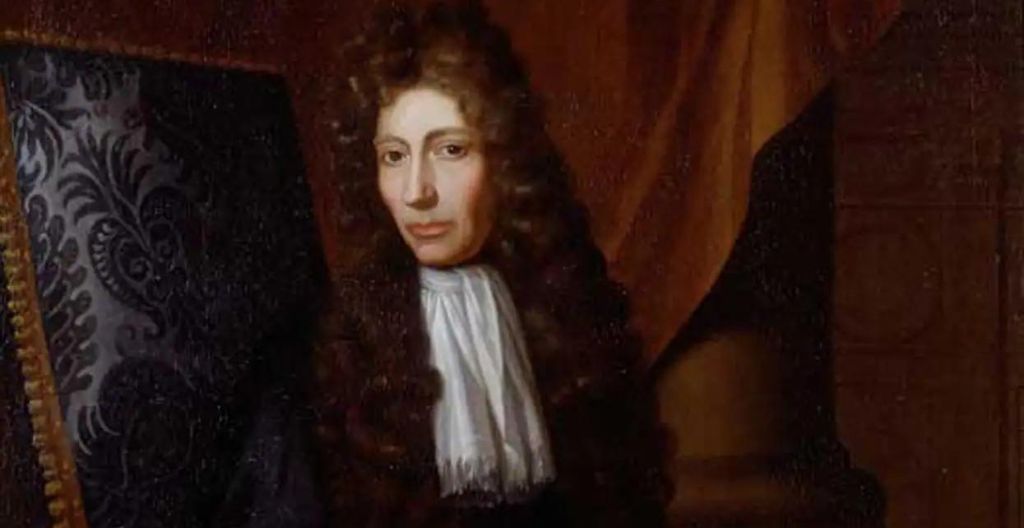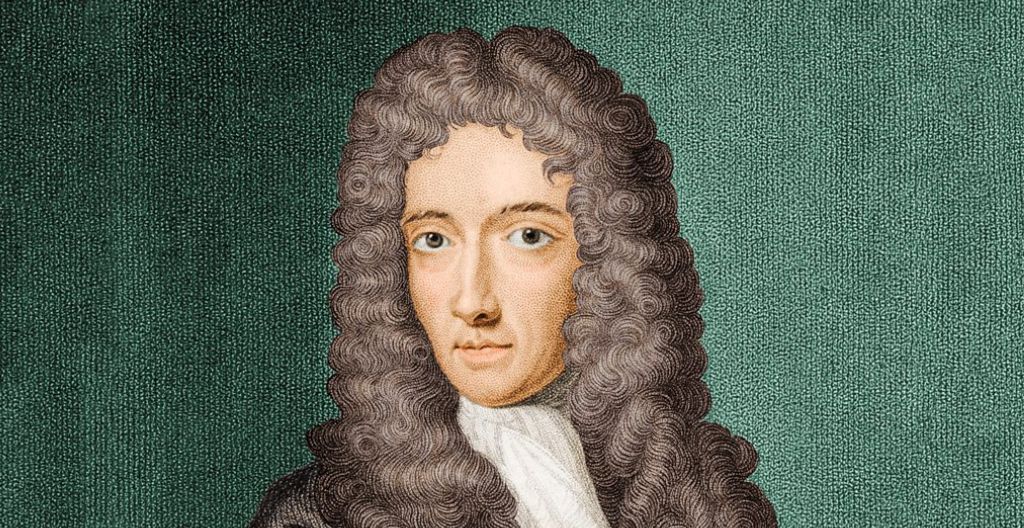Robert Boyle, often hailed as the ‘Father of Modern Chemistry’, profoundly shaped our scientific understanding through his pioneering contributions.
Born into an influential Irish family in 1627, his academic journey took him to prestigious institutions and across Europe.
His seminal work, Boyle’s Law, transformed the comprehension of gas pressure-volume relationship.
This article delves into Boyle’s life, remarkable discoveries, and enduring legacy in the realm of chemistry.
Key Takeaways
- Robert Boyle was a prominent figure in the field of chemistry and is known as the “Father of Modern Chemistry.”
- Boyle formulated Boyle’s Law, which describes the relationship between the volume and pressure of a gas.
- He conducted experiments on the properties of air and made important contributions to the understanding of elements and compounds.
- Boyle’s interest in theology led him to contribute to missionary societies and translate the Bible into different languages.
The Early Years and Education of Robert Boyle
Born in 1627, Robert Boyle, hailing from an influential Irish family, received a robust education in Latin, Greek, and French during his early years, fostering his intellectual curiosity that later resulted in groundbreaking contributions to chemistry.
So, who is Robert Boyle?
Boyle is a pioneering figure in the scientific revolution of the 17th century, known for his wide-ranging research, encompassing physics, chemistry, natural history, and philosophy. Most notably, he is revered for formulating ‘Boyle’s Law’, which illustrates the inverse relationship between the pressure and volume of a gas.
This principle laid the groundwork for subsequent advancements in thermodynamics, establishing Boyle’s legacy as a cornerstone of modern scientific understanding. Thus, Robert Boyle is renowned for his lasting impact on the scientific community.
Boyle’s Significant Scientific Discoveries
Among Robert Boyle’s significant scientific discoveries is Boyle’s Law, a fundamental principle in gas physics, and his pioneering work in the field of chemistry, both of which have had profound impacts on modern scientific understanding. Boyle’s Law, stating the inverse relationship between pressure and volume of a gas at a constant temperature, remains instrumental in various scientific and engineering fields. Furthermore, his groundbreaking work in chemistry, particularly his book ‘The Sceptical Chymist,’ laid the foundation for modern chemical theory, dismissing traditional alchemical beliefs. His scientific contributions, underpinned by rigorous experimentation, have shaped our understanding of the natural world.
| Discovery | Impact |
|---|---|
| Boyle’s Law | Fundamental principle in gas physics |
| ‘The Sceptical Chymist’ | Foundation of modern chemistry |
| Experimental Approach | Revolutionised scientific research |
An In-depth Look at Boyle’s Law
Why, in the context of Boyle’s Law, does the volume of a gas inversely correlate with its pressure when temperature is held constant?
This relationship is due to the kinetic theory of gases, which posits that gas molecules are in constant, random motion, and their collisions with the walls of a container lead to pressure.
When volume decreases, these molecules have less space to move, resulting in more frequent collisions and thus higher pressure. Conversely, increasing the volume allows for more space and fewer collisions, decreasing the pressure.
It’s crucial to note this law assumes an ideal gas, with no interactions between molecules except during collisions, and constant temperature, as changes in temperature would affect the kinetic energy and hence the pressure or volume.

Other Noteworthy Contributions to Science by Robert Boyle
In addition to formulating Boyle’s Law, Robert Boyle made significant strides in various scientific fields, contributing to our understanding of acids and bases, phosphorus’s role in plant growth, and the properties of color and light. His seminal work, ‘The Sceptical Chymist’, challenged traditional alchemical theories and advocated an empirical methodology, laying the groundwork for modern chemistry. His investigations into the nature of acids and bases revolutionised our perspective on these fundamental substances. Boyle’s research into the role of phosphorus in plant growth illuminated a cornerstone of agricultural science. Moreover, his experiments on the properties of color and light opened up new vistas in optics.
| Field | Contribution |
|---|---|
| Chemistry | Formulated Boyle’s Law, wrote ‘The Sceptical Chymist’ |
| Agriculture | Discovered phosphorus’s role in plant growth |
| Optics | Studied properties of color and light |
| Acids and Bases | Investigated their properties |
The Lasting Impact and Legacy of Robert Boyle’s Work
Robert Boyle’s work has not only paved the way for modern scientific methods and understanding, but it also continues to influence contemporary scientific thought and research.
His development of Boyle’s Law, which describes the relationship between the pressure and volume of a gas, remains a fundamental principle in the field of gas physics.
His emphasis on the use of experimental methods in scientific investigations revolutionised the way scientific research is conducted. From engineering to medicine, the applications of Boyle’s work are widespread and significant.
Even today, his writings continue to inspire scientists, researchers, and students alike. The legacy of Robert Boyle, often honored as the ‘Father of Chemistry’, endures in the persistent relevance and applicability of his discoveries to the evolving fields of science.
Sign up for our Life Sciences Newsletter and boost your engagement with HCPs
Frequently Asked Questions
What Were Robert Boyle’s Religious Beliefs and How Did They Influence His Work?
Robert Boyle was deeply religious, with his Christian beliefs influencing his scientific pursuits. He saw religion and science as complementary, his faith driving his curiosity about the natural world and shaping his approach to scientific inquiry.
Did Boyle Receive Any Significant Awards or Honors for His Contributions to Science During His Lifetime?
During his lifetime, Robert Boyle was highly respected for his scientific contributions. However, the prominent recognition, like the Copley Medal of the Royal Society, was not awarded until after his death.
What Were Some of the Major Challenges or Obstacles That Boyle Faced in His Scientific Research?
Robert Boyle faced various challenges in his scientific research, including the lack of developed scientific method, prevalent alchemical theories, and the absence of advanced technology for conducting precise experiments and measurements.
How Did Boyle’s Family Background and Upbringing Influence His Interest and Work in Science?
Boyle’s affluent family background and comprehensive education cultivated his fascination for science. His early exposure to multiple languages and travel broadened his perspective, encouraging scientific curiosity and paving the way for his groundbreaking work in chemistry.
Did Boyle Have Any Notable Collaborations or Rivalries With Other Scientists of His Time?
Robert Boyle collaborated with notable scientists like Robert Hooke and had intellectual rivalries, most famously with Thomas Hobbes over experimental philosophy, contributing significantly to the scientific landscape of the 17th century.
How Does Robert Boyle Relate to Scientific Content Creation?
Robert Boyle, a 17th-century philosopher, chemist, and inventor, significantly contributed to the method of scientific content creation through his pioneering use of the scientific method. Boyle is best known for Boyle’s Law regarding gases, but his real legacy lies in his approach to experimentation and insistence on scientific evidence. He advocated for experiments to be repeatable and for findings to be published for peer review, setting a foundation for modern scientific research and publication practices. His work in documenting experiments and the rationale behind them laid the groundwork for how scientific content is created, verified, and shared today, emphasizing the importance of empirical evidence and reproducibility in the advancement of knowledge.
Is Robert Boyle Related to the Scientific Model?
Yes, Robert Boyle is related to the concept of the scientific model through his contributions to the scientific method and his experimental approach to understanding natural phenomena. Boyle’s work, particularly in chemistry and physics, helped lay the foundation for the development and use of scientific models. By systematically experimenting and accurately describing the behavior of gases under different pressures (Boyle’s Law), he provided empirical data that could be used to create predictive models. These models, grounded in experimental evidence, allow scientists to predict the behavior of gases in various conditions. Boyle’s insistence on observation, experimentation, and the formulation of laws based on empirical evidence is a cornerstone of how scientific models are developed and validated in various fields of science today.
Conclusion
Robert Boyle’s groundbreaking work has left an indelible mark on the world of science, his theories and discoveries shaping modern chemical understanding. His teachings, most notably Boyle’s Law, continue to guide scientific inquiry, fostering advancements in numerous fields.
His legacy, celebrated through the Copley Medal, underscores the enduring impact of his contributions. Thus, Robert Boyle’s influence reverberates through the centuries, testament to his status as the ‘Father of Modern Chemistry’.

